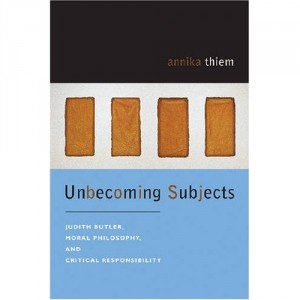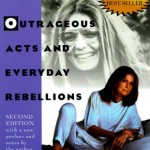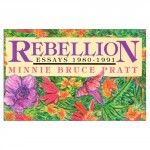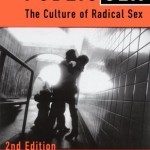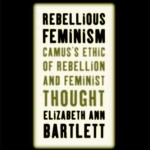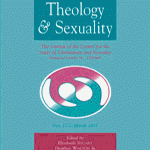 Last year I found this wonderfully titled article by Claudia Schippert in Theology and Sexuality: “Too Much Trouble? Negotiating Feminist and Queer Approaches in Religion.” (I also mention it here.) I have wanted to read it for a long time but, with all of the other things I have had to read, I just never got around to it. Now thanks to the summer (which is going by way too fast) and this blog, I have time and a reason to read it.
Last year I found this wonderfully titled article by Claudia Schippert in Theology and Sexuality: “Too Much Trouble? Negotiating Feminist and Queer Approaches in Religion.” (I also mention it here.) I have wanted to read it for a long time but, with all of the other things I have had to read, I just never got around to it. Now thanks to the summer (which is going by way too fast) and this blog, I have time and a reason to read it.
Schippert begins her essay by discussing the “troubling” relationship between queer-as-resisting-norms (Warner, Fear of a Queer Planet ) and ethics. She ponders two questions (actually, the same question, just worded differently): 1. “Are opposition to normativity and work in feminist ethics mutually exclusive endeavors” (47)? and 2. “Does Michael Warner’s well-known definition of queer theory as resistance to ‘heteronormativity’ contradict/preclude the doing of ethics or other engagement with norms” (48)?
The popular answer to this question, she argues, is yes. Many theorists believe that queer, as a practice and approach, is empty of ethical content. As a result, few studies of queer ethics exist (remember, this essay was originally a presentation at the American Academy of Religion conference in 1998). Even those ethical and/or queer theorists who answer “no” do so in a somewhat superficial way by merely replacing gay/lesbian with queer and simplistically equating it with defiant (52).
Linking her project with Janet Jakobsen’s essay “Queer is? Queer Does?” (which I discuss here), Schippert contends that queer ethics is possible but only by directly engaging with the tension (between resistance to norms–the queer project–and the production/analysis of norms–the ethical project) and by exploring the “specific practices of enacting and deploying norms” (53). She also refuses (in a wonderful moment of troublemaking) to offer a clear and final resolution to the tension between queer and norms. In particular, she does not want to resolve that tension by finding “better” norms (norms that are not heteronormative/oppressive/restrictive). She wants to shift attention towards: 1. examining “other” sites where the troubling of norms (through taking on the abject position) has been successful and 2. thinking through what those sites might have to offer scholars in their development of an ethics that takes queer resistance seriously.
Huh? I think I understand what she is saying here. Central to her argument is the concept of taking on the abject position. First, by abject she means the “realm of unintelligibility which contains that which is cast out” (58). The abject position is inhabited by those who don’t make sense, whose experiences/bodies/identities/practices aren’t recognized as normal or coherent and who exist outside of the dominant framework of white and heterosexual. By “taking on” the abject position, she means two things: 1. embodying or taking up the abject position and 2. defying/resisting that position. This abject position, which she discusses in relation to Evelynn Hammonds and her article, “Black W(holes) and the Geometry of Black Female Sexuality,” and Judith Butler and her notion of “reworking of abjection into political agency” in Bodies That Matter, is not quite a position (because it is untelligible). But, in taking it on, it is possible to attend to the material effects of those norms that produce one as abject (taking on = embodying) and to reject/disavow (taking on = defiance) those norms.
Ummm…I thought I understood what she was saying, but now I am not so sure. I think I am almost there but her argument (which connects Butler, Hammonds and Katie Cannon with ethical critiques of queer and the citing of queer in religion) seems a little too crowded here. I do like her final paragraph (even as I am not quite sure how she gets there–almost…but not quite):
Expanding the very meaning of what counts as valuable bodies…
Wait, what does she mean here? Let me look at her earlier argument again. I think she is arguing, by drawing upon Katie Cannon and her work in Womanist Ethics, that taking on (embodying) the abject position but refusing to fully inhabit it (taking on as resistance) enables us to rework norms and open up new positions and understandings of what counts as normal/valued/valuable bodies.
…will, without a doubt, get us into more, and different kinds of, trouble.
Trouble in the form of disrupting disciplines (like religion/religious ethics), reworking what counts as resistance and a resisting position, and disturbing traditional notions of what counts as a valued and intelligible body.
But, finally, to answer the other questions I asked earlier [is trouble worth it?]: yes, it definitely would be worthwhile (63).
I like her emphasis on trouble in this essay. Trouble as having ethical possibility. Trouble (through taking on the abject position) as reworking/expanding our understandings of normativity and as attending to material effects of that normative process. As I mentioned before, I still feel as if I have a tenuous understanding of her argument. Maybe I need to turn to a later version of it in “Turning on/to Ethics” from Bodily Citations.
This essay is from 2006…8 years after the first article. At first glance, Schippert seems to be offering a very similar argument using Butler, Hammonds and Cannon again. Yet, one key ingredient is missing: trouble. Schippert has shifted her argument away from a focus on trouble (as that which connects the readings, as a popular and important way to think about Butler’s work and queer theory’s relation to ethics, and as the useful product of exploring tensions between queer resistance and norm production). The title of the essay is now, “Turning on/to ethics” and refers to how Butler’s work is not a turning on (as in evading, defying, betraying) ethics, but a turning to it.
Why does Schippert move away from the language of trouble? Could this shift reinforce my belief that one popular reading of Butler’s recent work as a turn to ethics is actually a turn away from the immature/youthful/anti-ethical ideas about trouble-as-disruption-and-subversion that permeate Gender Trouble? Sigh…Wait, could this move from “Too much trouble?” to “Turning on/to Ethics” play a key role in my analysis of Butler’s so-called shift? I think so. Excellent.
Of course, I still need to figure out exactly what Schippert’s argument is in both of these articles. More on that soon….


